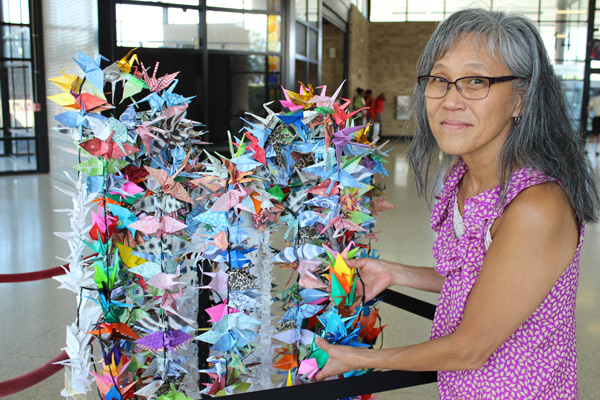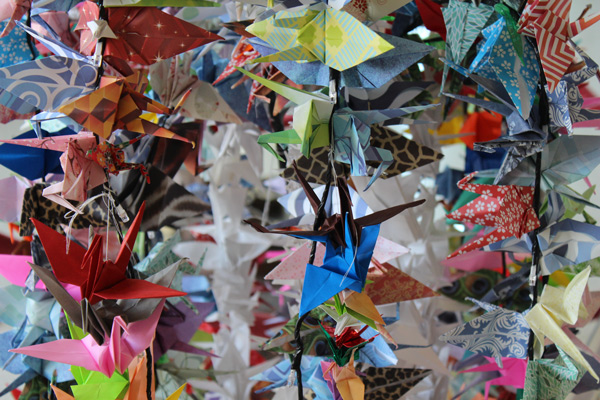UM-Flint Social Work & Correctional Facility Pilot Origami Project

This summer University of Michigan-Flint Social Work associate professor Elizabeth Collardey led a group of young men living at the Thumb Correctional Facility in Lapeer, Michigan through the intricate paper folding process of making 1,000 origami peace cranes.
A dozen 17 to 22 year-old youthful offenders, who are serving varying sentences at the Lapeer facility, participated in the arts enrichment pilot program.
Now through December, members of the public can enjoy the group's colorful peace cranes on display at Flint's downtown MTA bus station. The small paper cranes were arranged on a tree structure in the lobby of the MTA building with assistance from UM-Flint University Outreach and Traci Currie, UM-Flint Communications and Visual Arts lecturer.
The beautiful public exhibit serves as a visual reminder of everyone's responsibility to take time to understand other people, show compassion, and strive to live in peace with one another.
"I wanted this to be a positive class about peace," Collardey said while recently visiting the display. "The papers are bold colors. The guys in the program liked the patterned paper the most, and some even drew their own patterns. They learned this so quickly."
In years past, Collardey worked closely with youth at the Colorado Division of Youth Corrections. This summer seemed to be the right time for her to pilot this program at the Thumb Correctional Facility and once again positively influence youth while supporting their goals for self-improvement.

Two young men who participated in the pilot peace program at Thumb Correctional Facility reflected on the class and what they learned by providing handwritten feedback to questions about the project. Due to confidentiality and facility restrictions, their names were not released for print.
An 18-year old man living in the facility explained that he grew up in a small town and enjoys nature, helping people, and building things. He appreciated Collardey's step-by-step instructions in the class.
"Making peace cranes helped me find out that I can get along with a lot of different kinds of people," he said. "It can help me in the future."
A 20-year-old man originally from Lansing, who has his GED, reflected on how his interest in art and working with his hands inspired him to learn origami through this program.
At one point, the men were challenged to fold cranes with their eyes closed. "At first I thought it was impossible," he said, "but then it was pretty easy just concentrating on the folds. That's all you need is to know your folds and feel for them. I think making peace cranes with all of us young men was very awesome because we knew it was for a good cause, and everyone talked about stuff with each other. I learned I can be very patient and how I want things to be perfect."
Related Posts
No related photos.
- College of Arts, Sciences & Education
- Communication and Visual Arts
- Community
- Faculty
- Social Work
- University News
- University Outreach
UM-Flint News
The Office of Marketing & Communications can be reached at [email protected].